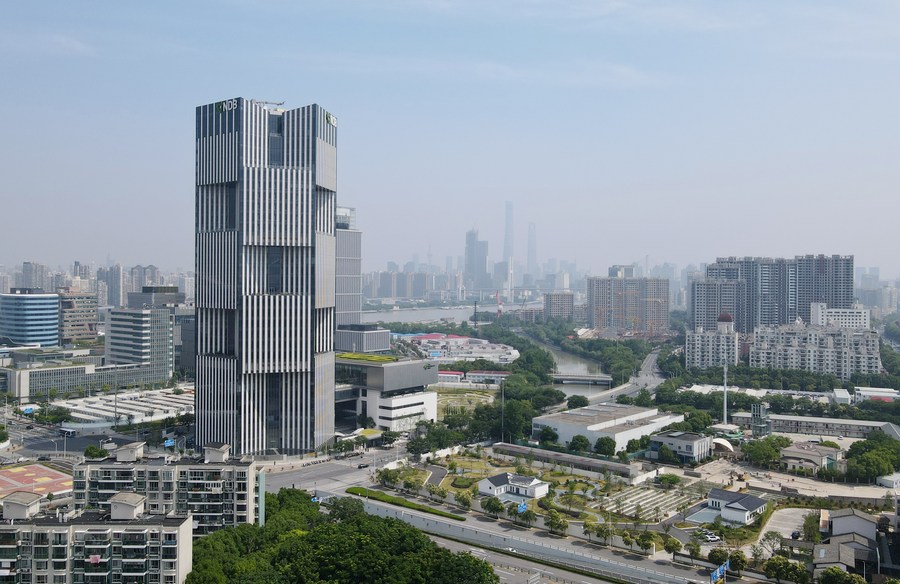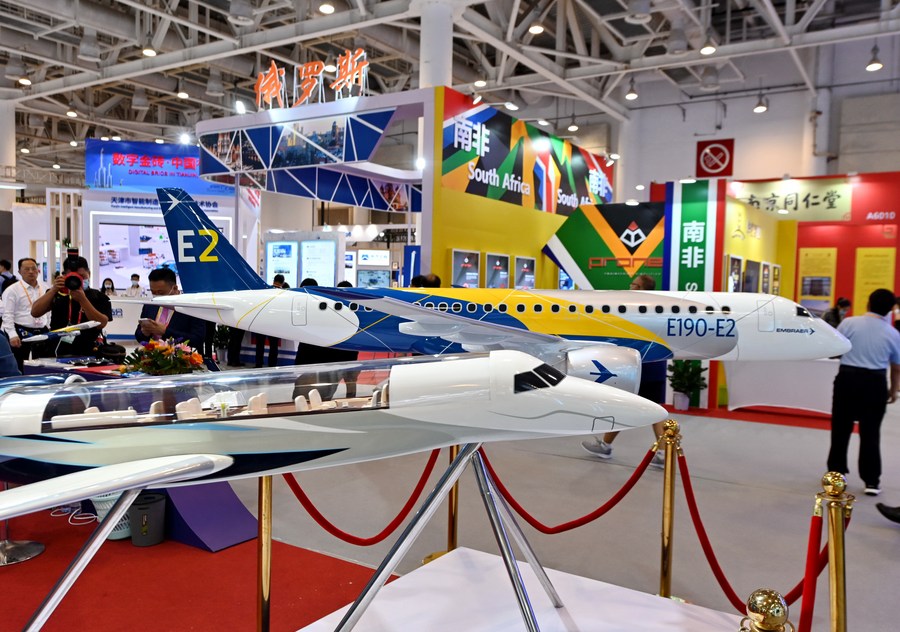
Shabby infrastructure has troubled the Padre Leo Schneider School in northern Brazil for long enough. The road outside its gate -- muddy in winter and dusty in summer -- has scared off quality teachers and reduced student attendance.

Aerial photo taken on June 17, 2022 shows the headquarters building of the New Development Bank (NDB), also known as the BRICS bank, in east China's Shanghai. (Xinhua/Fang Zhe)
Things will change in a few months. Thanks to funding from the New Development Bank (NDB), the road will be paved with asphalt and built with a drainage system, part of an urban development project covering nine cities in Brazil's Para state.
The project, together with many other BRICS-funded or initiated programs, has illustrated the importance of the group -- an acronym for the emerging markets of Brazil, Russia, India, China and South Africa -- for developing countries and the world. The BRICS itself is home to over 40 percent of the world's population and about a quarter of the global economy.
Facing headwinds like the COVID-19 pandemic and major changes rarely seen in a century, the world, particularly the developing south, has high expectations for this week's BRICS summit.
FIVE FINGERS OF A FIST
Like five fingers of a fist, the BRICS countries have closely cooperated since the group's inception in 2006. Infrastructure, green finance, the digital economy and global governance reform have been firm areas of collaboration.
Since 2006, the BRICS countries have proven a constructive force in modernizing economies and reallocating aid resources to more deserving countries, said Cavince Adhere, a Kenya-based international relations scholar.
During the past 16 years, the BRICS has set up a series of cooperation mechanisms including the NDB, the Contingent Reserve Arrangement, the BRICS Business Council and the BRICS Partnership on New Industrial Revolution Innovation Center.
To fight the COVID-19 pandemic, the group launched the BRICS Vaccine Research and Development Center in March. In May, BRICS health ministers agreed to establish an early warning system for large-scale pandemics.
Earlier this month, the group's economic and trade ministers pledged to deepen cooperation in trade, sustainable development, supply chains and multilateral trade mechanisms.
Intensified collaboration has also been nailed down in aerospace, information and communications, the environment, new energy and biotechnology.

BRICS mechanism is based on creating a spirit of openness, inclusiveness and win-win cooperation. Common ground is sought while differences are preserved, Wang Lei, director of the Center for BRICS Cooperation Studies at Beijing Normal University, told Xinhua.
Since assuming the BRICS chairmanship this year, China has held more than 70 conferences and activities, covering politics, security, trade and finance, people-to-people exchanges, sustainable development and public health.
China has made practical contributions to BRICS regarding financial security, technology, human resources, agriculture and infectious diseases, said Wang.
As the rotating chair, China has prioritized promoting poverty alleviation and food security, which is "a welcome step," said B. R. Deepak, chairperson of the Center of Chinese and Southeast Asian Studies at the New Delhi-based Jawaharlal Nehru University. "China's experience in poverty reduction and increasing the income of the peasantry would come in handy and be beneficial for poverty eradication."
ECONOMIC BALLAST
The BRICS mechanism provides a stage for the voices of developing countries to be heard, said Zhu Xufeng, executive director of the Institute for Sustainable Development Goals, Tsinghua University.
Amid a shifting international landscape and global pandemic, the five countries have become a ballast for global economic development, added Zhu.
"The BRICS countries in the year 2022 become all the more important," said Herman Tiu Laurel, founder of Philippine BRICS Strategic Studies, stressing that the mechanism allows the BRICS countries to push the global community to focus attention on development again.
Speaking of China's chairmanship, Kin Phea, director-general of the International Relations Institute at the Royal Academy of Cambodia, said he believes China will tap the occasion to promote the BRICS spirit of openness, inclusiveness and win-win cooperation.
Under the theme of "Foster High-quality BRICS Partnership, Usher in a New Era for Global Development," the 14th summit offers BRICS countries an opportunity to increase people-to-people exchanges, intensify coordination on major international and regional issues and broaden South-South cooperation.
The summit aims to build consensus on achieving stronger, greener and healthier global development.
"The BRICS will be able to play a more important role in preventing the fragmentation of the world," as developing and underdeveloped countries have suffered "the worst consequences" of the pandemic, climate change and geopolitical conflicts, Luis Antonio Paulino, a professor in the Faculty of Philosophy and Sciences at Sao Paulo State University, told Xinhua.
BRICS EXPANSION DISCUSSED
When China was the BRICS chair back in 2017, it proposed the "BRICS Plus" cooperation model, which aims to forge the most influential platform of South-South cooperation and build a broader mutually beneficial partnership with more emerging markets and developing countries. Several rounds of dialogue have been held since.
The latest one in May was the "BRICS Plus" dialogue at the foreign minister level. It was attended by participants from the BRICS countries and Kazakhstan, Saudi Arabia, Argentina, Egypt, Indonesia, Nigeria, Senegal, United Arab Emirates and Thailand.
"'BRICS Plus' reflects the true spirit of multilateralism and multiculturalism and can consequently guarantee the survival of emerging markets and developing countries," said Phea. "It would also enhance global security governance and safeguard world peace and tranquility."

Photo taken on Sept. 8, 2021 shows an intelligent robot dog during an exhibition on BRICS New Industrial Revolution held in Xiamen, southeast China's Fujian Province. (Xinhua/Lin Shanchuan)
The start of a possible BRICS expansion is also being discussed, with many countries expressing readiness to join the group. In an online meeting in May, BRICS foreign ministers supported advancing the process of BRICS expansion and indicated that further discussions would be held on this issue.
By acknowledging developing countries as a potent force for global economic growth, BRICS has earned the international community's respect, said Adhere.
The "BRICS Plus" mechanism will "enable more developing countries and emerging markets to participate in BRICS cooperation, thus strengthening solidarity among developing countries and encouraging them to work together for the reform of the international governance system," said Wang Lei. "Otherwise, it will be very difficult to change."
"BRICS cooperation enjoys bright prospects and boundless potential," said Zhang Rui, Chinese director of the Confucius Institute of the Russian State University for the Humanities. The "BRICS Plus" mechanism will raise the voice of developing countries in the international arena, encouraging them to actively meet challenges and achieve peace and development.